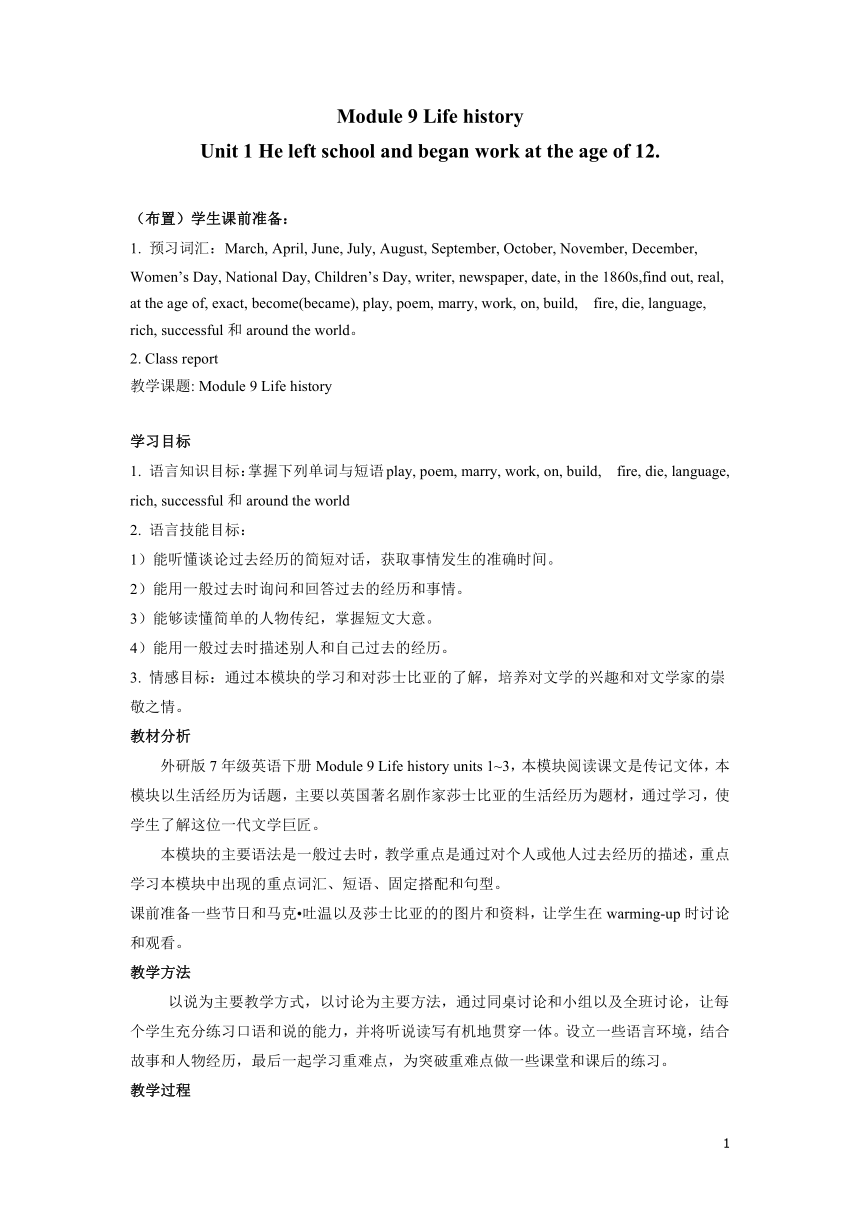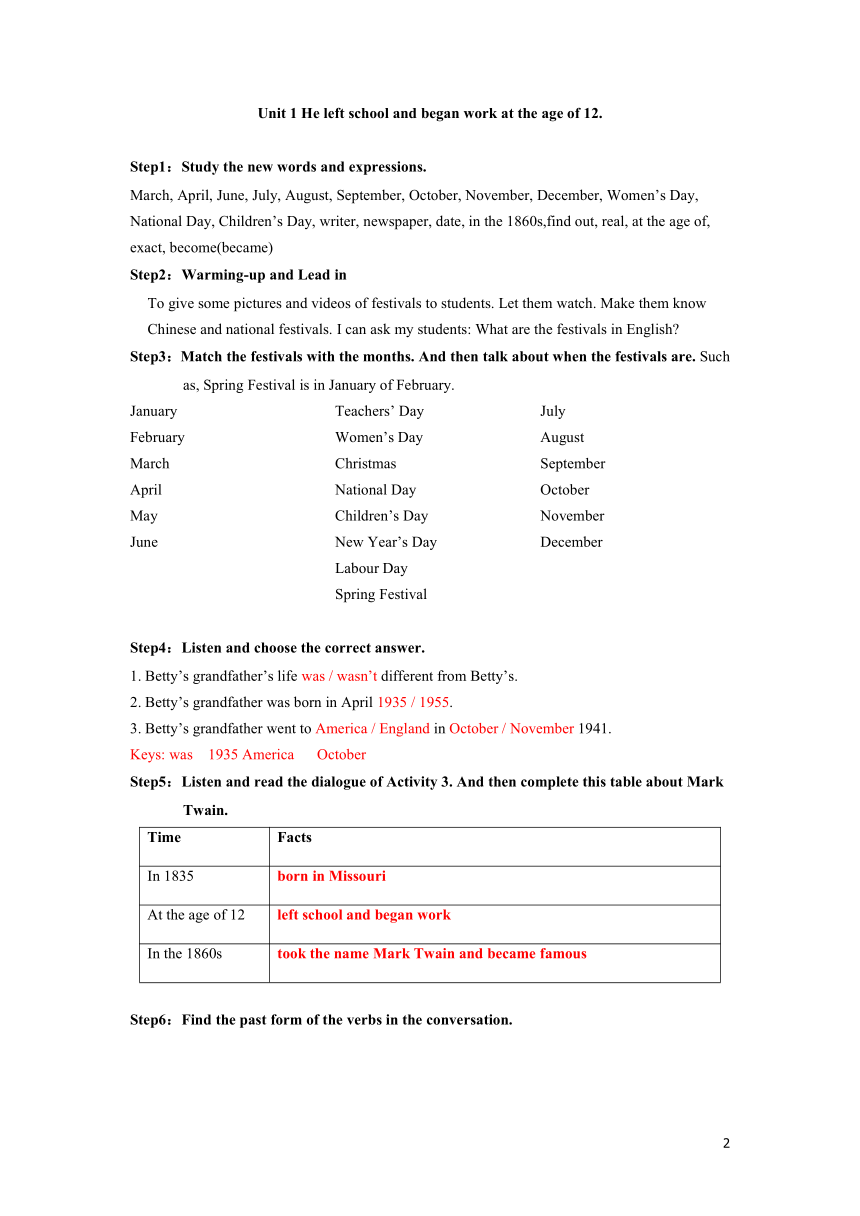外研(新标准)版 七年级下 Module 9 Unit 1 He left school and began work at the age of twelve. 教案
文档属性
| 名称 | 外研(新标准)版 七年级下 Module 9 Unit 1 He left school and began work at the age of twelve. 教案 |  | |
| 格式 | doc | ||
| 文件大小 | 50.5KB | ||
| 资源类型 | 教案 | ||
| 版本资源 | 外研版 | ||
| 科目 | 英语 | ||
| 更新时间 | 2022-07-09 13:44:23 | ||
图片预览


文档简介
Module 9 Life history
Unit 1 He left school and began work at the age of 12.
(布置)学生课前准备:
1. 预习词汇:March, April, June, July, August, September, October, November, December, Women’s Day, National Day, Children’s Day, writer, newspaper, date, in the 1860s,find out, real, at the age of, exact, become(became), play, poem, marry, work, on, build, fire, die, language, rich, successful和around the world。
2. Class report
教学课题: Module 9 Life history
学习目标
1. 语言知识目标:掌握下列单词与短语play, poem, marry, work, on, build, fire, die, language, rich, successful和around the world
2. 语言技能目标:
1)能听懂谈论过去经历的简短对话,获取事情发生的准确时间。
2)能用一般过去时询问和回答过去的经历和事情。
3)能够读懂简单的人物传纪,掌握短文大意。
4)能用一般过去时描述别人和自己过去的经历。
3. 情感目标:通过本模块的学习和对莎士比亚的了解,培养对文学的兴趣和对文学家的崇敬之情。
教材分析
外研版7年级英语下册Module 9 Life history units 1~3,本模块阅读课文是传记文体,本模块以生活经历为话题,主要以英国著名剧作家莎士比亚的生活经历为题材,通过学习,使学生了解这位一代文学巨匠。
本模块的主要语法是一般过去时,教学重点是通过对个人或他人过去经历的描述,重点学习本模块中出现的重点词汇、短语、固定搭配和句型。
课前准备一些节日和马克 吐温以及莎士比亚的的图片和资料,让学生在warming-up时讨论和观看。
教学方法
以说为主要教学方式,以讨论为主要方法,通过同桌讨论和小组以及全班讨论,让每个学生充分练习口语和说的能力,并将听说读写有机地贯穿一体。设立一些语言环境,结合故事和人物经历,最后一起学习重难点,为突破重难点做一些课堂和课后的练习。
教学过程
Unit 1 He left school and began work at the age of 12.
Step1:Study the new words and expressions.
March, April, June, July, August, September, October, November, December, Women’s Day, National Day, Children’s Day, writer, newspaper, date, in the 1860s,find out, real, at the age of, exact, become(became)
Step2:Warming-up and Lead in
To give some pictures and videos of festivals to students. Let them watch. Make them know Chinese and national festivals. I can ask my students: What are the festivals in English
Step3:Match the festivals with the months. And then talk about when the festivals are. Such as, Spring Festival is in January of February.
January Teachers’ Day July
February Women’s Day August
March Christmas September
April National Day October
May Children’s Day November
June New Year’s Day December
Labour Day
Spring Festival
Step4:Listen and choose the correct answer.
1. Betty’s grandfather’s life was / wasn’t different from Betty’s.
2. Betty’s grandfather was born in April 1935 / 1955.
3. Betty’s grandfather went to America / England in October / November 1941.
Keys: was 1935 America October
Step5:Listen and read the dialogue of Activity 3. And then complete this table about Mark Twain.
Time Facts
In 1835 born in Missouri
At the age of 12 left school and began work
In the 1860s took the name Mark Twain and became famous
Step6:Find the past form of the verbs in the conversation.
be was/were know left
become bought leave met
begin came read read
do did take saw
get got write sent
go went
Step7:Complete the sentences with the correct form of the words from the box.
Age become Europe newspaper real writer
1. He began work at the ______ of 12.
2. His ______ name was Samuel Clemens.
3. He wrote for a(n) ______ .
4. He _________ very famous.
5. He went to _________, but he didn’t come to China.
6. He is a great _________ .
Keys: age real newspaper became Europe writer
Step8:Pronunciation and speaking
Listen and repeat the Activity 6.
Step9:Work in pairs. Ask and answer the questions about Mark Twain.
— Did Mark Twain stay in Missouri
— No, he didn’t.
1. Was Mark Twain his real name
2. Did Betty read Tom Sawyer?
3. Did Mark Twain leave school at 16?
4. Did Mark Twain become a newspaper writer
5. Did Mark Twain come to China
Keys:
1. No, it wasn’t.
2. Yes, she did.
3. No, he didn’t.
4. Yes, he did.
5. No, he didn’t.
Step10:Explain and study the important and difficult points.
1. Usage of “by”
2. Possessive of Noun
3. find ~ find out
Step12:Homework
Review and recite the important points of Unit 1.
.
PAGE
4
Unit 1 He left school and began work at the age of 12.
(布置)学生课前准备:
1. 预习词汇:March, April, June, July, August, September, October, November, December, Women’s Day, National Day, Children’s Day, writer, newspaper, date, in the 1860s,find out, real, at the age of, exact, become(became), play, poem, marry, work, on, build, fire, die, language, rich, successful和around the world。
2. Class report
教学课题: Module 9 Life history
学习目标
1. 语言知识目标:掌握下列单词与短语play, poem, marry, work, on, build, fire, die, language, rich, successful和around the world
2. 语言技能目标:
1)能听懂谈论过去经历的简短对话,获取事情发生的准确时间。
2)能用一般过去时询问和回答过去的经历和事情。
3)能够读懂简单的人物传纪,掌握短文大意。
4)能用一般过去时描述别人和自己过去的经历。
3. 情感目标:通过本模块的学习和对莎士比亚的了解,培养对文学的兴趣和对文学家的崇敬之情。
教材分析
外研版7年级英语下册Module 9 Life history units 1~3,本模块阅读课文是传记文体,本模块以生活经历为话题,主要以英国著名剧作家莎士比亚的生活经历为题材,通过学习,使学生了解这位一代文学巨匠。
本模块的主要语法是一般过去时,教学重点是通过对个人或他人过去经历的描述,重点学习本模块中出现的重点词汇、短语、固定搭配和句型。
课前准备一些节日和马克 吐温以及莎士比亚的的图片和资料,让学生在warming-up时讨论和观看。
教学方法
以说为主要教学方式,以讨论为主要方法,通过同桌讨论和小组以及全班讨论,让每个学生充分练习口语和说的能力,并将听说读写有机地贯穿一体。设立一些语言环境,结合故事和人物经历,最后一起学习重难点,为突破重难点做一些课堂和课后的练习。
教学过程
Unit 1 He left school and began work at the age of 12.
Step1:Study the new words and expressions.
March, April, June, July, August, September, October, November, December, Women’s Day, National Day, Children’s Day, writer, newspaper, date, in the 1860s,find out, real, at the age of, exact, become(became)
Step2:Warming-up and Lead in
To give some pictures and videos of festivals to students. Let them watch. Make them know Chinese and national festivals. I can ask my students: What are the festivals in English
Step3:Match the festivals with the months. And then talk about when the festivals are. Such as, Spring Festival is in January of February.
January Teachers’ Day July
February Women’s Day August
March Christmas September
April National Day October
May Children’s Day November
June New Year’s Day December
Labour Day
Spring Festival
Step4:Listen and choose the correct answer.
1. Betty’s grandfather’s life was / wasn’t different from Betty’s.
2. Betty’s grandfather was born in April 1935 / 1955.
3. Betty’s grandfather went to America / England in October / November 1941.
Keys: was 1935 America October
Step5:Listen and read the dialogue of Activity 3. And then complete this table about Mark Twain.
Time Facts
In 1835 born in Missouri
At the age of 12 left school and began work
In the 1860s took the name Mark Twain and became famous
Step6:Find the past form of the verbs in the conversation.
be was/were know left
become bought leave met
begin came read read
do did take saw
get got write sent
go went
Step7:Complete the sentences with the correct form of the words from the box.
Age become Europe newspaper real writer
1. He began work at the ______ of 12.
2. His ______ name was Samuel Clemens.
3. He wrote for a(n) ______ .
4. He _________ very famous.
5. He went to _________, but he didn’t come to China.
6. He is a great _________ .
Keys: age real newspaper became Europe writer
Step8:Pronunciation and speaking
Listen and repeat the Activity 6.
Step9:Work in pairs. Ask and answer the questions about Mark Twain.
— Did Mark Twain stay in Missouri
— No, he didn’t.
1. Was Mark Twain his real name
2. Did Betty read Tom Sawyer?
3. Did Mark Twain leave school at 16?
4. Did Mark Twain become a newspaper writer
5. Did Mark Twain come to China
Keys:
1. No, it wasn’t.
2. Yes, she did.
3. No, he didn’t.
4. Yes, he did.
5. No, he didn’t.
Step10:Explain and study the important and difficult points.
1. Usage of “by”
2. Possessive of Noun
3. find ~ find out
Step12:Homework
Review and recite the important points of Unit 1.
.
PAGE
4
同课章节目录
- Module 1 Lost and found
- Unit 1 Whose bag is this?
- Unit 2 Are they yours?
- Unit 3 Language in use
- Module 2 What can you do ?
- Unit 1 I can play the piano
- Unit 2 I can run really fast
- Unit 3 Language in use
- Module 3 Making plans
- Unit 1 What are you going to do at the weekends?
- Unit 2 We're going to cheer the players.
- Unit 3 Language in use
- Module 4 Life in the future
- Unit 1 Everyone will study at home
- Unit 2 Every family will have a small plane.
- Unit 3 Language in use
- Module 5 Shopping
- Unit 1 What can I do for you?
- Unit 2 You can buy everything on the Internet
- Unit 3 Language in use
- Module 6 Around town
- Unit 1 Could you tell me how to get to the Nationa
- Unit 2 The London Eye is on your right.
- Unit 3 Language in use
- Revision module A
- Module 7 My past life
- Unit 1 I was born in a small village.
- Unit 2 I was born in Quincy.
- Unit 3 Language in use
- Module 8 Story time
- Unit 1 Once upon a time….
- Unit 2 Goldilocks hurried out of the house.
- Unit 3 Language in use
- Module 9 Life history
- Unit 1 He left school and began work at the age of
- Unit 2 He decided to be an actor.
- Unit 3 Language in use
- Module 10 A holiday journey
- Unit 1 What did you do?
- Unit 2 This morning we took a walk.
- Unit 3 Language in use
- Module 11 Body language
- Unit 1 They touch noses!
- Unit 2 Here are some ways to welcome them.
- Unit 3 Language in use
- Module 12 Western music
- Unit 1 It's so beautiful!
- Unit 2 Vienna is the centre of European classical
- Unit 3 Language in use
- Revision module B
